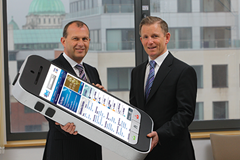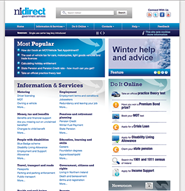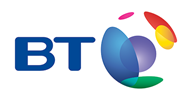Creating an eGovernment exemplar
 Designed to encourage digital interaction between citizen and government, the NI Direct service is a change programme that is already improving government service delivery capability through the strategic partnership established between BT and the Northern Ireland Civil Service.
Designed to encourage digital interaction between citizen and government, the NI Direct service is a change programme that is already improving government service delivery capability through the strategic partnership established between BT and the Northern Ireland Civil Service.
Last October, BT was awarded a contract by Northern Ireland’s Department of Finance and Personnel (DFP) to help improve public access to government services by leveraging new digital channels of communication. Similar initiatives have been a feature of public sector activity around the world as governments have looked to engage with citizens more efficiently and effectively through the use of emerging technologies.
The BT partnership with NI Direct is the latest step in a major shared services reform programme that has become an eGovernment exemplar, according to Paul Wickens, Chief Executive of Enterprise Shared Services (ESS), the directorate within DFP with responsibility for delivering high quality innovative shared services to the Northern Ireland Civil Service. “We regularly host visitors from across the globe and government departments come over from Great Britain on a regular basis. They are all impressed at the level of innovation we have been able to deliver in shared services,” he said.
For BT, the new contract will allow further expansion of their partnership approach as well as an opportunity to share their expertise in delivering new innovative services. “We will work together with government organisations to ensure that NI Direct becomes the central point for citizen interaction,” explained Peter Russell, BT’s Head of Public Sector and Major Business in Northern Ireland. “It will provide online, telephone, web chat, email, SMS text and social media services to allow people to access a number of different government services through a wide range of channels.”
Encouraging channel shift from traditional channels by creating a range of effective and easy to use digital services has long been recognised as a way to save money while increasing efficiency, but successful execution has proved difficult. Not just because of the skills required for underpinning user-friendly services with complex technologies, but also because of the change management process needed to bring everyone along on the journey.
Shared journey
Both BT and the public sector in Northern Ireland have a track record of surmounting such obstacles to achieve genuine transformation. The two have already worked successfully together on the ESS Finance shared service delivered through Account NI that has achieved significant savings and efficiencies by centralising all of the Civil Service’s financial systems in one place.
Implicit in that service and now NI Direct is a commitment to the public and private sectors working in genuine partnership. “We recognise that we need to enhance what we have and help innovate through creative solutions. With regards to NI Direct, BT is now part of that strategy, ” said Paul Wickens.
Russell relishes the challenge of building something together that reflects the changing needs of society. “The partnership with NI Direct will focus on increasing the range, usage and quality of digital interactions and services which deliver the greatest impact and efficiency for the public and departments,” he said. “We are delighted to have the opportunity to work in partnership with NI Direct, and to bring our innovative technologies, processes and skills to bear to hopefully make this programme a great success.”
BT and the NICS are acutely aware of the increasing adoption of digital technologies by Northern Ireland citizens. 74 per cent of the population is now online, 34 per cent own a smartphone and 49 per cent have used social networking. In order to successfully tap into this digital revolution, the development of intuitive interactions and promotion of a self-service approach is required.
“Technology is absolutely critical but it has to be completely aligned to supporting our business requirements,” said Wickens. “When I switch the light on in my office, I don’t worry about how the electricity is being generated or who’s providing it. It’s the same with NI Direct. It’s a utility service that has to deliver the necessary outcomes.”
He describes it as the “plumbing and infrastructure”. Regardless of whether it’s a sophisticated customer relationship management solution or content management system, it has to be kept transparent to anyone using the service. “A key success factor for me is that the citizens and stakeholders never see the complexity of the technical solution. I prefer to look at NI Direct as a service-led project rather than a technology project,” he said.
“Our customers want a service provider and partner that has the technical capabilities to deliver but also has the right cultural ‘fit’ and a genuine customer-centric focus,” said Peter Russell. “We are constantly making investments in people, processes and systems, and forging new partner relationships that help us in solving business challenges for clients.”
BT has been on the ground in Northern Ireland for decades and is one of the few technical service providers that continue to make a significant investment in the region’s infrastructure. But the tender process for the NI Direct contract sought an organisation that could also manage sub-contractor relationships. “Because of our partnerships with leading local and global ICT organisations, we have an end-to-end capability that is quite unique. It really helps us capitalise on staying at the forefront of technological innovation,” said Russell.
Having the right technology and the right kind of partner is a large part of any transformational programme but both BT and DFP knew from experience that managing change effectively required much more than these two core elements. Without buy-in from the key stakeholders right across government, then ultimately NI Direct would fail.
“To migrate services to digital channels and make them the primary means of communicating with citizens is a massive cultural shift which is why we sought a mandate from the Head of the Civil Service and also senior civil servants within the Permanent Secretaries Group,” said Wickens.
Gaining buy-in from the most senior of stakeholders was identified as crucial to success. This buy-in has been supported by establishing proper governance and conveying a clear message on our ‘digital first’ agenda. Thankfully this support has been unequivocal, and as a result, departments and agencies have a clear understanding that digital online services and transactions are the first choice when it comes to interacting with citizens or businesses. If departments are developing or refreshing programmes, there should be ‘a presumption in favour’ of using NI Direct first.
The scale and complexity of the NI Direct programme is extensive and it’s to the credit of all parties involved that so much has already been achieved in such a short space of time since the contract was awarded. Central to the success has been the very strong relationship between the teams from both BT and the wider NI Direct programme.
“The BT partnership approach is critical because they need to understand the way we work, the structures and processes that we have,” said Paul Wickens. “It’s a very constructive relationship and there is great synergy at all levels.”
It’s anticipated that global visitors from many different governments will be coming to Northern Ireland to monitor the progress of this exemplar project for many years to come.
The NI Direct programme was established in 2008 as part of the response to addressing a public service target, which sought to improve access to government services by developing a multi-channel approach utilising the web, telephone and SMS text channels. The development of the programme was also supported by the findings of the Northern Ireland Consumer Council, which revealed that people don’t know or care about which council or agency is responsible for a service; they just want an easy way to make contact.
In the first phase of its launch, multiple public service numbers were consolidated, first call resolutions improved, and an intelligent directory service routed more difficult queries to the most appropriate person. More recently, NI Direct has been responsive to the changing needs of citizens, given that more people expect to use online services, and looked to procure the expertise that would allow it to accelerate the availability of online services and drive uptake. BT was able to show expertise in this field through its experience with initiatives such as Liverpool Direct, which showcased its ability to deliver an end-to-end solution.
To facilitate the development of service delivery channels that can be shared by a growing number of departments and organisations, BT has embarked on front-to-back transformation. The NI Direct contact centre will benefit from a next-generation unified contact centre platform. The platform will facilitate the integration all of the contact centre services through effective CRM (customer relationship management), workflow, content management, web and application development, web services, social media and integration with line of business systems.
The cost of online transactions, particularly where there is a self-service component, is considerably less than face-to-face engagements but added value comes from integrating the back office. “There is no point having a paperless front-end system if you have to print out the contents of an email and it turn it into a manual process at the back,” said Paul Wickens.
Core to the NI Direct approach, in terms of cost savings and efficiency, are a number of reusable components that deliver a consistent multi-channel experience for users. The components address the needs of common types of government/citizen interaction, namely:
• Report it;
• Request it;
• Book it;
• Pay it;
• Find it (geographic location services); and
• Tell us (feedback and consultations).
A number of exemplar projects in each of these service areas have been established for transformation and development by the NI Direct team. Another 46 services have been lined up over the next two years. Existing anchor tenants, such Land and Property Services (LPS), will benefit from continual service improvements and in addition to the new service development for the new departments and agencies that are coming on board.
Under the NI Direct contract, BT is also responsible for delivery of the Flooding Incident Line on behalf of the flood response agencies (FRAs). The Flooding Incident Line (FIL) is an additional government service that provides a single number for citizens to use to report serious flooding. It is available 24 hours a day, seven days a week and the number is 0300 2000 100.
Improvements to these services under the NI Direct partnership include increasing the capacity in the number of agents who can take these calls when incidents occur. The Flooding Incident Line essentially takes the calls from citizens and hands them over to the appropriate flood response agencies: the Roads Service, the Rivers Agency and NI Water. The agencies then assume responsibility for the issue and decide on the best course of action.
Asidua
Operating globally from offices in Belfast, Birmingham and Dublin, Asidua delivers world-class integration, software and consultancy services to both public sector and corporate clients. As a Microsoft Gold Certified Partner, Asidua has an unparalleled ability to architect innovative and transformational Service-oriented Architecture (SoA) solutions. The NI Direct project will see BT operate and manage a multi-channel customer contact solution. One of the components helping to deliver this solution is Asidua’s Customer Contact Platform™ (CCP), the same platform that has both been selected to deliver BT’s Next Generation Customer Access capability, and is already in use in a number of local authorities in the UK.
“The use of Asidua’s CCP solution allowed us to propose a cost-effective, proven and scalable multi-channel platform as a core element of our bid. Being able to actively demonstrate true online transactions as well as an efficient means of dealing with the traditional telephony channel helped BT differentiate our proposal in what was a very competitive tender.”
www.asidua.com
Deloitte
Deloitte is the brand under which tens of thousands of dedicated professionals in independent firms throughout the world collaborate to provide audit, consulting, financial advisory, risk management, and tax services to selected clients. Its approach combines insight and innovation from multiple disciplines with business and industry knowledge to help its clients excel anywhere in the world.
“We will be utilising the expertise of Deloitte when delivering specialist business advisory services throughout the life cycle of the NI Direct Partnership. This will include business case development, project and programme management, organisational design, HR and change management as well as strategy and business planning, which will be crucial to the overall approach and delivery of the wider NI Direct programme.”
KANA
KANA Lagan streamlines the service operations of public sector organizations across departments, data and communication channels, increasing process flexibility and handling efficiency, and enabling better government-to-citizen communication. KANA Lagan enables secure citizen access to government services and information in the channels that citizens make use of in their daily lives.
“Continuing the successful relationship established between NI Direct and Kana by the use of their customer contact CRM solution enabled us to streamline service delivery, reduce and increase citizen engagement with NI Direct. From back-end processes to front-line functionality, KANA provides the software to enable end-to-end process management and a complete view of customers and cases across social, mobile, web and contact centre channels.”
Arise
Arise Virtual Solutions Inc. is the world’s leading provider of virtual business process outsourcing and crowdsourcing solutions for brands seeking to improve their customer experience and results. Arise customises and delivers high quality voice, email, chat and mobile customer service solutions through its network of thousands of small businesses in the United States, Canada, the United Kingdom and Ireland.
“We have developed a productive working relationship with Arise as it allows us to provide on-demand support in highly critical but fluctuating demand scenarios. Arise’s highly skilled experts are able to respond whatever the emergency and provide us with an ability to support customers when we need to but without in-built costs when we don’t need the service.”
www.arise.com









